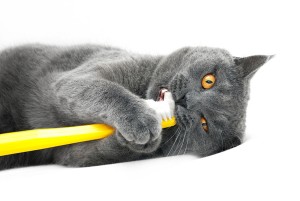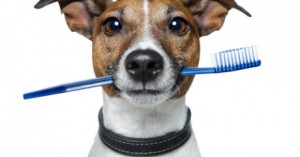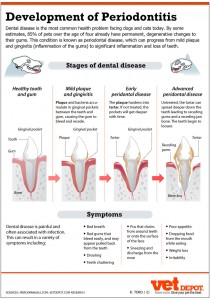Preventative Oral Care for your Pet
Understanding the importance of dental care for our pets has come a long way in the last few decades. Although, dental care may not be something that first comes to mind when thinking of your pet’s health care, it should be something you consider. Just like us, plaque and tartar continually build up on our pet’s teeth. We would have a hard time going our whole life without brushing our teeth or having our teeth cleaned. The same can be said for our pets.
Here are some tips on how to help keep your pet’s teeth and mouth healthy
Brushing Teeth: Using an enzymatic pet toothpaste (with a finger-brush, gauze, toothbrush, washcloth) and brushing your pets teeth as often as possible (at least once a week) will do a world of good for preventing large problems later. It is important to note that you should stick to cleaning the outside of your pet’s teeth, not the inner/tongue area. The beauty of enzymatic toothpaste is that it’s all about the contact, not how hard you brush. If your dog or cat doesn’t like you having your finger near their mouth try spreading a little of the enzymatic toothpaste on a chew treat. Toothpaste often comes in many flavors (poultry, mint, malt, etc…) to help entice your pet to enjoy brushing. Just make sure that the toothpaste is enzymatic, and NEVER use human toothpaste on your pet.
Food, Dental Treats & Water Additives:
Food can play a big part in helping with your pet’s plaque and tarter build-up. Feeding dry food, instead of just wet or soft food, can act as a toothbrush as your pet chews the hard kibbles. Soft food, on the other hand, doesn’t give your furry friend that abrasive action that helps “brush” their teeth. Larger kibble food is recommended (even with small dogs) to encourage them to chew more than with smaller kibble. There are also veterinary prescribed dental pet foods (available for felines as well). Consult your veterinarian to see if a specially designed dental pet food would be good for your pet.
There are also many types of treats designed to help with tartar and plaque build-up. These treats can be found in pet stores and your local veterinarian offices. It’s always a good idea to consult with your veterinarian first before deciding on a dental treat as there are many varieties and your pet may need or respond to a brand/type better than another. Taking a look at products recommended by the Veterinary Oral Health Council (VOHC) is a good start.
Water additives are another group of products that may help with your pet’s oral health; be aware that the success rate isn’t entirely clear. If you would like to try a water additive we recommend putting out two water bowls. One with the additive and another without (especially if you have a cat). This way, if your pet doesn’t like the additive they will still have access to fresh water.
Professional Cleaning:
During your pet’s annual wellness visit your veterinarian does a general check of the mouth and may recommend a professional cleaning. A professional cleaning is generally done while your pet is under anesthesia. They will get a thorough cleaning from a veterinarian technician and a full oral exam from the veterinarian. A professional cleaning is important to prevent dental disease from getting out of control. For some pets with minimal dental disease and tolerant behavior; an anesthesia-free dental cleaning may be an option. To learn more about professional cleaning, or anesthesia-free dental cleaning, please visit our links.
It is important to remember that there is not one “cure-all” that will stop your furry companion from having plaque and tartar build-up, or from developing dental disease. With the combination of tips mentioned in this blog and help from your veterinarian, your pet could enjoy a happier and healthier mouth.
- Progression of Dental Disease



